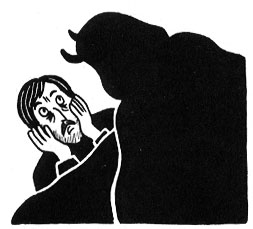 By Marjane Satrapi
By Marjane Satrapi
96 pages, black and white
Published by Pantheon Books
I don’t think there’s any denying that Marjane Satrapi didn’t so much arrive in comics as she burst onto the scene with her autobiographical Persepolis graphic novels. A huge success (both commercially and creatively) in both comic and movie format, it’s safe to say that Persepolis will be a work that leaps first to mind for most people when they hear about Satrapi. While she’s released two books for adults since then, though, they seem to have slightly fallen under the radar. So with Chicken With Plums just being re-released in paperback, it seemed a good at time as any to see what Satrapi’s been up to since Persepolis.
Chicken With Plums is a biographical comic about Nasser Ali Khan, a renowned musician in Iran as well as Satrapi’s great-uncle. When Nasser Ali’s tar—his musical instrument—is broken, he finds himself unable to find a replacement that can ever play as well. And so, in the depths of depression, he decides that it is the end of his life. And slowly, over eight days in his bed, Nasser Ali wastes away. But in doing so, we learn so much more about Nasser Ali’s past, as well as what’s in store for his family’s future.
 Chicken With Plums is an odd book, there’s no way around it. I suspect that most people will find it a little hard to empathize with Nasser Ali’s plight, and it’s a big stumbling block for any potential readers. Satrapi deliberately doesn’t help the reader, either, with the opening chapters of Chicken With Plums. Nasser Ali comes across in those pages as a very arrogant, self-absorbed man. Satrapi’s showing us how he appeared on the surface to everyone around him, and it’s easy to see why Nasser Ali alienated and frustrated people left and right. Then, as Nasser Ali decides that his bed will become his deathbed, Satrapi begins to examine Nasser Ali’s past and let us try and understand the events that landed Nasser Ali in such a tumultuous marriage and his path to becoming a musician.
Chicken With Plums is an odd book, there’s no way around it. I suspect that most people will find it a little hard to empathize with Nasser Ali’s plight, and it’s a big stumbling block for any potential readers. Satrapi deliberately doesn’t help the reader, either, with the opening chapters of Chicken With Plums. Nasser Ali comes across in those pages as a very arrogant, self-absorbed man. Satrapi’s showing us how he appeared on the surface to everyone around him, and it’s easy to see why Nasser Ali alienated and frustrated people left and right. Then, as Nasser Ali decides that his bed will become his deathbed, Satrapi begins to examine Nasser Ali’s past and let us try and understand the events that landed Nasser Ali in such a tumultuous marriage and his path to becoming a musician.
Because Chicken With Plums is a biography, it comes off as a little flippant to say that the book’s main character is one that Satrapi should have tried to make more likable. After all, she’s telling Nasser Ali Khan’s story, not one about a fictional creation. But none the less, it is a little boggling as to exactly why Satrapi decided that she needed to tell the world about Nasser Ali Khan’s end of days. Understanding how Nasser Ali became the man he did and agreeing with it are two very different things, and when the book was over I still found myself more than a little cold towards the man. He may have been a musical genius, but because this is a book rather than a film, we don’t get to gain any sort of appreciation for his musical talents. Instead all we as readers have to go on is what Satrapi tells us, and I left the book thinking that Nasser Ali was a slightly pathetic man who ends up with a stronger legacy than he may have deserved on a personal level.
 On the bright side, Satrapi does a good job of the actual storytelling, here. Her dips into Nasser Ali’s past are expected, and weaving in-between Nasser Ali’s wife Nahid’s memories of how they met with Nasser Ali’s perception of the series of events is handled deftly. (If anything, Chicken With Plums made me feel bad for poor Nahid; if the book was really meant to slyly vindicate Nahid under the guise of celebrating Nasser Ali, it worked.) I was also impressed with how Satrapi is able to shift in the future, explaining what will happen to Nasser Ali’s family after he’s gone, without feeling trite or forced. It’s an interesting look at legacy, and how children remember and honor their parents. In many ways, it’s the most interesting part of the book. Satrapi’s art is still simple and stark, but there’s one part in particular that jumped out at me—a dream of Nasser Ali’s involving actress Sophia Loren’s beautiful breasts. It’s drawn with such a beautiful, deep ink line that it reminded me of art you might see in Love and Rockets; both Jaime and Gilbert Hernandez have celebrated the female form in their comics, and that one page is akin to their work.
On the bright side, Satrapi does a good job of the actual storytelling, here. Her dips into Nasser Ali’s past are expected, and weaving in-between Nasser Ali’s wife Nahid’s memories of how they met with Nasser Ali’s perception of the series of events is handled deftly. (If anything, Chicken With Plums made me feel bad for poor Nahid; if the book was really meant to slyly vindicate Nahid under the guise of celebrating Nasser Ali, it worked.) I was also impressed with how Satrapi is able to shift in the future, explaining what will happen to Nasser Ali’s family after he’s gone, without feeling trite or forced. It’s an interesting look at legacy, and how children remember and honor their parents. In many ways, it’s the most interesting part of the book. Satrapi’s art is still simple and stark, but there’s one part in particular that jumped out at me—a dream of Nasser Ali’s involving actress Sophia Loren’s beautiful breasts. It’s drawn with such a beautiful, deep ink line that it reminded me of art you might see in Love and Rockets; both Jaime and Gilbert Hernandez have celebrated the female form in their comics, and that one page is akin to their work.
Chicken With Plums is a strange book, one that felt to me oddly inconsequential. I appreciate Satrapi’s attempt to tell this story of a man who died before she was born, but it’s hard to say what she’s really trying to accomplish here. I’m a little worried that she’s getting locked into the genre of Iranian biographies and I’d like to see her try something entirely different with her next book. She’s a good storyteller, but Chicken With Plums made me feel like she was a little too constricted by the biography format to be able to tell another story as engaging as her own life stories from Persepolis. Until then, I’m afraid that Satrapi’s newer works are destined to be read, talked about briefly, and then forgotten. It’s not a bad book, but it’s lacking that extra memorable punch. Hopefully her next book will bring that back.
Purchase Links: Amazon.com | Powell’s Books
